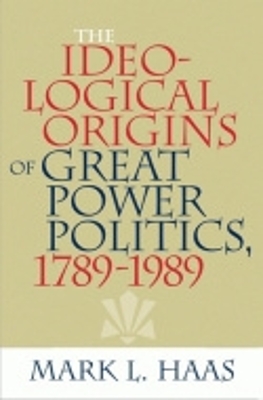Cornell Studies in Security Affairs
2 total works
The Ideological Origins of Great Power Politics, 1789–1989
by Mark L. Haas
How do leaders perceive threat levels in world politics, and what effects do those perceptions have on policy choices? Mark L. Haas focuses on how ideology shapes perception. He does not delineate the content of particular ideologies, but rather the degree of difference among them. Degree of ideological difference is, he believes, the crucial factor as leaders decide which nations threaten and which bolster their state's security and their own domestic power. These threat perceptions will in turn impel leaders to make particular foreign-policy choices. Haas examines great-power relations in five periods: the 1790s in Europe, the Concert of Europe (1815–1848), the 1930s in Europe, Sino-Soviet relations from 1949 to 1960, and the end of the Cold War. In each case he finds a clear relationship between the degree of ideological differences that divided state leaders and those leaders' perceptions of threat level (and so of appropriate foreign-policy choices). These relationships held in most cases, regardless of the nature of the ideologies in question, the offense-defense balance, and changes in the international distribution of power.
In Frenemies Mark L. Haas addresses policy-guiding puzzles such as: Why do international ideological enemies sometimes overcome their differences and ally against shared threats? Why, just as often, do such alliances fail?
Alliances among ideological enemies confronting a common foe, or "frenemy" alliances, are unlike coalitions among ideologically-similar states facing comparable threats. Members of frenemy alliances are perpetually torn by two powerful opposing forces. Haas shows that shared material threats push these states together while ideological differences pull them apart. Each of these competing forces has dominated the other at critical times. This difference has resulted in stable alliances among ideological enemies in some cases but the delay, dissolution, or failure of these alliances in others.
Haas examines how states' susceptibility to major domestic ideological changes and the nature of the ideological differences among countries provide the key to alliance formation or failure. This sophisticated framework is applied to a diverse range of critical historical and contemporary cases, from the failure of British and French leaders to ally with the Soviet Union against Nazi Germany in the 1930s to the likely evolution of the United States' alliance system against a rising China in the early 21st century.
In Frenemies, Haas develops a groundbreaking argument that explains the origins and durability of alliances among ideological enemies and offers policy-guiding perspectives on a subject at the core of international relations.

